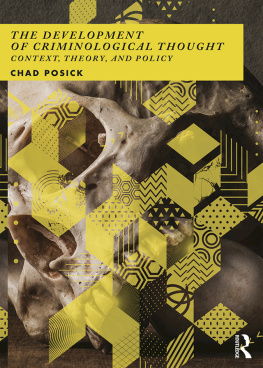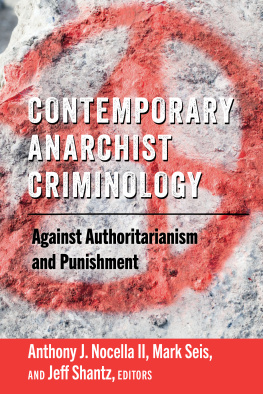
Great Debates in Criminology
This book explores the role of theory and research in criminology. Adopting a unique and refreshing approach to criminological theory, it focuses on the great debates in criminology from its inception as a field to the present day. It explores the debates that have motivated criminological thought, that have represented turning points in theoretical and empirical trajectories, that have offered mini-paradigm shifts, and that have moved the field forward. Coverage includes:
Classical debates, including the work of Lombroso, Durkheim, and Sutherland;
Sociological vs. psychological debates in criminology;
Control theory and cultural deviance theory;
Criminal career and trait-based theory;
Theory testing in criminology;
Critical theories in criminology;
Debates on the state of criminology and criminal justice;
Policy issues in criminology.
Each chapter explores several key debates, summarizes key points, and offers a discussion of the current empirical status. This book is novel in emphasizing the role of debate in criminology and offering an enlightening synthesis of theorists and their perspectives. It is essential reading for students taking courses on criminological theory and teachers of those theories.
Chad Posick is Associate Professor of Criminal Justice and Criminology and Graduate Coordinator at Georgia Southern University.
Michael Rocque is Assistant Professor of Sociology at Bates College and Senior Research Advisor at the Maine Department of Corrections.
Great Debates documents the development of criminologys critical theory, research, and policy tensions. The book provides an important birds eye view of where weve been and where were going. Its a handbook that should be on every criminologists desk.
Joshua C. Cochran, Assistant Professor, School of Criminal Justice, University of Cincinnati
This well-researched and highly stimulating book presents excellent reviews of great debates in criminology, including sociological versus psychological perspectives, social control versus social learning, and criminal careers versus criminal propensity. It also reviews methodological debates (e.g. on trajectory analysis) and policy implications. It should be mandatory reading for all criminologists!
David P. Farrington, Emeritus Professor of Psychological Criminology, University of Cambridge
If there is anything that criminologists can agree on is that we enjoy spirited debates about the causes and correlates of crime as well as the policy decisions that need to be made in dealing with crime. It is appropriate, then, that we have a volume that nicely presents the different points of view on key criminological and criminal justice matters. Posick and Rocque develop what I believe to be the book that students will learn from and by challenged by as they delve into the heart of the either/or views on crime, one that provides an objective presentation of the sides and their facts.
Alex R. Piquero, Ashbel Smith Professor of Criminology, The University of Texas at Dallas
Posick and Rocque provide a unique point-counterpoint overview of the leading concepts and various assumptions framing major explanations of crime. In a chronological unfolding of classical statements to contemporary perspectives, Great Debates in Criminology leads readers through an ideologically balanced, empirically informed, and engaging introduction to theoretical criminology.
J. Mitchell Miller, Editor of the American Journal of Criminal Justice
Great Debates in Criminology
Chad Posick and Michael Rocque
First published 2019
by Routledge
2 Park Square, Milton Park, Abingdon, Oxon OX14 4RN and
by Routledge
711 Third Avenue, New York, NY 10017
Routledge is an imprint of the Taylor & Francis Group, an informa business
2019 Chad Posick and Michael Rocque
The right of Chad Posick and Michael Rocque to be identified as authors of this work has been asserted by them in accordance with sections 77 and 78 of the Copyright, Designs and Patents Act 1988.
All rights reserved. No part of this book may be reprinted or reproduced or utilised in any form or by any electronic, mechanical, or other means, now known or hereafter invented, including photocopying and recording, or in any information storage or retrieval system, without permission in writing from the publishers.
Trademark notice : Product or corporate names may be trademarks or registered trademarks, and are used only for identification and explanation without intent to infringe.
British Library Cataloguing-in-Publication Data
A catalogue record for this book is available from the British Library
Library of Congress Cataloging-in-Publication Data
Names: Posick, Chad, author. | Rocque, Michael, author.
Title: Great debates in criminology / Chad Posick and Michael
Rocque.
Description: Abingdon, Oxon; New York, NY: Routledge, 2018. |
Includes bibliographical references and index.
Identifiers: LCCN 2018003799| ISBN 9781138223714 (hardback) |
ISBN 9781138223738 (pbk.) | ISBN 9781315403861 (ebook)
Subjects: LCSH: CriminologyHistory.
Classification: LCC HV6021 .P673 2018 | DDC 364dc23
LC record available at https://lccn.loc.gov/2018003799
ISBN: 978-1-138-22371-4 (hbk)
ISBN: 978-1-138-22373-8 (pbk)
ISBN: 978-1-315-40386-1 (ebk)
Typeset in Sabon and Avenir
by Florence Production Ltd, Stoodleigh, Devon, UK
Marvin D. Krohn
The most difficult task in teaching students at both the advanced undergraduate and graduate levels is bringing them to a point where they appreciate the differences and similarities between ideas addressing the same or similar issues. Most students can identify the components of theories and are capable of defining the constructs and concepts. It is when they are challenged to compare and contrast those ideas that we note deficiencies in both their understanding of the theories and the implications of the differences in those ideas. In part this is due to the manner in which textbooks and lectures present those ideas. Generally, each set of ideas or theories is presented as a unit with limited discussion of the interplay between the components. Some discussions include sections on the intellectual antecedents of theories and some have sections that contrast some of the ideas put forth in one theory to those of another theory. Yet these sections are typically very limited. It is, therefore, not surprising that when students respond to questions that ask for comparisons between theories, the bulk of their answers is comprised of describing the ideas of each theory and then a one- or two-para graph response to what should have been the main focus of their answers.
The question arises as to whether there is a way to convey the material in a manner that encourages students to think deeply and critically about ideas. How do we get students to want to delve deeper into the nuances of theories and their differences? In Great Debates in Criminology, Chad Posick and Michael Rocque make a convincing case for the value of theoretical debates, not only for the advancement of the discipline but also for generating an interest in and appreciation for criminological theory.







